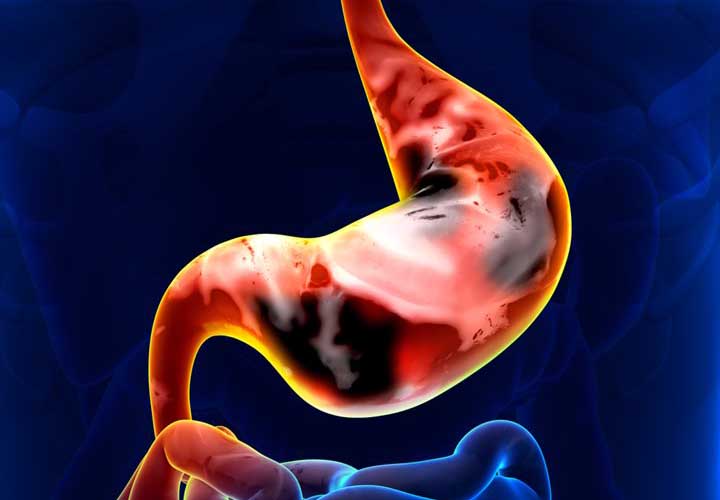Stomach cancer occurs when cancerous cells form in the stomach lining. This type of cancer usually doesn’t cause symptoms until the later stages, so it’s often not diagnosed until the later more advanced stages. While difficult to detect, treatment for stomach cancer is possible through chemotherapy, radiation therapy, and surgery.
Stomach cancer is characterized by a growth of cancerous cells within the lining of the stomach. Also called gastric cancer, this type of cancer is difficult to diagnose because most people typically don’t show symptoms in the earlier stages. According to the National Cancer Institute (NCI), there will be approximately 24,590 new cases of stomach cancer in 2015.
The NCI estimates that stomach cancer makes up only 1.5 percent of new cancer cases in the United States. While stomach cancer is relatively rare compared to other types of cancer, one of the biggest dangers of stomach cancer is the difficulty of diagnosing it. Since stomach cancer usually doesn’t cause any early symptoms, it often goes undiagnosed until after it spreads to other parts of the body, making it more difficult to treat.
Though stomach cancer can be hard to diagnose and treat, it’s important to get the knowledge you need to beat the disease.
What Causes Stomach Cancer?
Your stomach (along with the esophagus) is just one part of the upper section of your digestive tract. Your stomach is responsible for digesting food and then moving the nutrients along to the rest of your digestive organs, namely the small and large intestines.
Stomach cancer occurs when normally healthy cells within the upper digestive system become cancerous and grow out of control, forming a tumor. This process happens slowly, so stomach cancer tends to develop over many years.
Risk Factors
Stomach cancer is directly linked to tumors in the stomach. However, there are some factors that might increase your risk of developing these cancerous cells. These risk factors include certain diseases and conditions, such as:
- Lymphoma (a group of blood cancers).
- H. pylori bacterial infections (a common stomach infection that can sometimes lead to ulcers).
- Tumors in other parts of the digestive system.
- Stomach polyps (abnormal growths of tissue that form on the lining of the stomach).
- Stomach cancer is also more common among older adults (usually those 50 years and older. Men.
- Those with a family history of the disease.
- Individuals who are of Asian (especially Korean or Japanese), South American, or Belarusian descent.
- While your personal medical history can impact your risk of developing stomach cancer, certain lifestyle factors can also play a role. You may be more likely to get stomach cancer if you:
- Eat a lot of salty or processed foods
- Eat too much meat
- Have a history of alcohol abuse
- Don’t exercise
- Don’t store or cook food properly
You may want to consider getting a screening test if you believe you’re at risk for getting stomach cancer. Screening tests are performed when people are at risk for developing certain diseases but don’t show symptoms yet.
Symptoms of Stomach Cancer
According to the NCI, there are typically no early signs or symptoms of stomach cancer. Unfortunately, this means that people often don’t know anything is wrong until the cancer has reached an advanced stage.
Some of the most common symptoms of advanced stomach cancer are:
- Nausea/vomiting
- Frequent heartburn
- Loss of appetite (sometimes accompanied by sudden weight loss)
- Constant bloating
- Early satiety (feeling full after eating only a small amount).
- Bloody stools
- Jaundice (a yellowish discoloration in the eyes and skin).
- Excessive fatigue
- tomach pain (which may be worse after meals)
Diagnosis of Stomach Cancer
Since people with stomach cancer rarely show symptoms in the early stages, the disease is often not diagnosed until it’s more advanced. To make a diagnosis, your doctor will first perform a physical exam to check for any abnormalities. They may also order a blood test, including a test for the presence of H. pylori bacteria.
More diagnostic tests will need to be done if your doctor believes that you show signs of stomach cancer. Diagnostic tests specifically look for suspected tumors and other abnormalities in the stomach and esophagus. These tests may include:
- An upper GI endoscopy (a procedure that uses a small camera on the end of a thin, flexible probe to look at the esophagus and stomach)
- A biopsy (tissue sample)
- Imaging tests, such as CT scans and X-rays
Treatment of Stomach Cancer
Traditionally, stomach cancer is treated with one or more of the following:
- Chemotherapy
- Radiation therapy
- Surgery
- Immunotherapy, such as vaccines and medication
Your exact treatment plan will depend on the origin and stage of the cancer. Age and overall health can also play a role. Aside from treating cancer cells in the stomach, the goal of treatment is to prevent the cells from spreading. Stomach cancer, when left untreated, may spread to the following places:
- Lungs
- Lymph nodes
- Bones
- Liver
Prevention Of Gastric Adenocarcinoma
Stomach cancer alone can’t be prevented. However, you can lower your risk of developing all cancers by:
- Maintaining a healthy weight
- Eating a balanced, low-fat diet
- Quitting smoking
- Exercising regularly
In some cases, doctors may even prescribe medications that can help lower the risk of stomach cancer. This is usually done for people who have other diseases that may contribute to the cancer.
You may also want to consider getting an early screening test. This test can be helpful in detecting stomach cancer. Your doctor may use one of the following screening tests to check for signs of stomach cancer:
- Physical exam
- Lab tests, such as blood and urine tests
- Imaging procedures, such as X-rays and CT scans
- Genetic tests
Long Term Outlook for Stomach Cancer
Your chances of recovery are better if the diagnosis is made in the early stages. According to the NCI, about 29 percent of all stomach cancer patients survive at least five years after being diagnosed. The majority of these survivors have a localized diagnosis. This means that the stomach was the original source of the cancer. When the origin is unknown, it can be difficult to diagnose and stage the cancer. This makes the cancer harder to treat.
It’s also more difficult to treat stomach cancer once it reaches the later stages. If your cancer is more advanced, you may want to consider participating in a clinical trial. Clinical trials help determine whether a new medical procedure, device, or other treatment is effective for treating certain diseases and conditions. You can see if there are any clinical trials of treatments for stomach cancer on the NCI website. The website also has resources to help you and your loved ones cope with a stomach cancer diagnosis and its subsequent treatment.
Featured Image: DepositPhotos/decade3d



